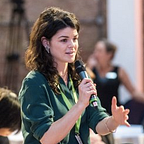How to move fast when starting up
There is a reason why Facebook has the mantra ‘move fast and break things’.
Speed matters.
Startups are a competition against an unseen opponent; you don’t know how similar they are to you, or how close to the finish line they might be.
Speed matters.
So how do I move fast?
First time founders struggle to move fast. They feel overwhelmed with a lack of structure and deadlines. We see this everyday at Entrepreneur First.
There’s an easy way to fix this.
“When eating an elephant, take one bite at a time.” Creighton Abrams
First, you need to know what you’re aiming for.
Second you need to break down your larger goal into small, daily tasks.
Set goals
At EF we use OKRs (Objectives, Key Results), a popular framework to help companies set goals and then achieve them as a team. When you are in the initial days of founding a startup, it’s worth using a simple version of this.
First, you should agree as a co-founding team what the most important objective is for your company’s survival. Normally this is fundraising, or generating revenue to allow you to bootstrap. You should agree on the metrics that will allow you to survive.
Second, you should then set a time frame around that — for example, when will you run out of personal funds?
Third, break down that goal into monthly, weekly and daily steps.
For example, we need to raise £250,000 in six months time. For that to happen we need to have traction of 10 customers using an early version of the product with £100 revenue per month per customer. Revenue should be doubling every month.
Work backwards to create simple steps
To help you understand how you should focus your time, you should work backwards from your goal. If you need to have traction in six months time, what do you need to do now to make sure that happens? Let’s work through the example I outlined above.
Revenue doubling
To be able to show that revenue is doubling, you need to have been making revenue for at least two months. This means that you need customers to start paying by end of month 4.
Having a product to sell
To be able to charge per a customer, you need to have a functioning, if basic, product that they can use. This means the prototype needs to be built by end of month 4.
£100 revenue per a month, per customer
To have paying customers, you need to have a sales funnel. That means you need to have sales meetings with customers from month 3.
Building a product customers will pay for
To ensure the product meets the customers’ needs, you need to have tested early versions with a couple of test customers. This means that you need to be testing the product with customers from the middle of month 2.
Finding customers to test the product with
To find customers who can test the product you need to have had 50 customer meetings by end of month 2 to get at least 10 to convert.
To get 10 to convert, you need to understand their problem deeply
To get customers, you need to understand what you are selling them and why. This means you need to have in depth customer exploration conversations with at least 40 customers before the end of month 1.
To get the initial meetings
To find the potential customers you need to spend time reaching out to them — cold emails, warm introductions, hunting them down on LinkedIn etc. You need to send 400 emails per a day to find them.
Now you know where to start.
Goals create discipline
When you break down the goal into a series of steps, each with their own deadline, you suddenly feel pretty busy.
When you know you have weekly and monthly deadlines, you know exactly where your focus lies. Suddenly, it doesn’t make sense to go to those pointless networking drinks or to spend hours creating your logo. Everything you do should feed into your overall objective.
The best founders are highly disciplined and use their time effectively. They move faster, make more progress and have better outcomes.
It takes discipline to create and stick to a plan, but it’s the only way to eat the elephant.
